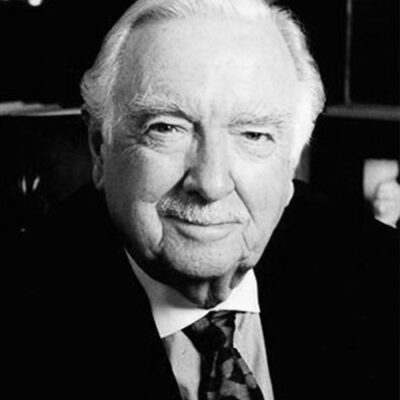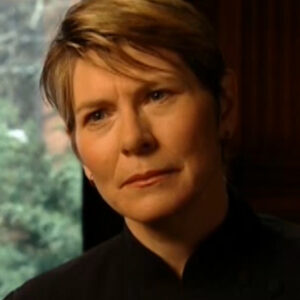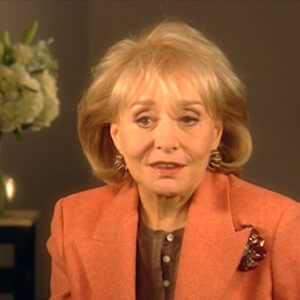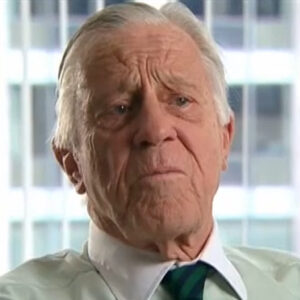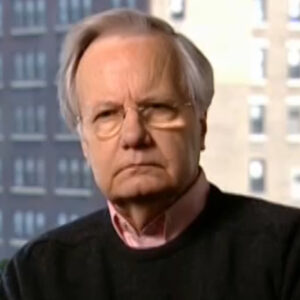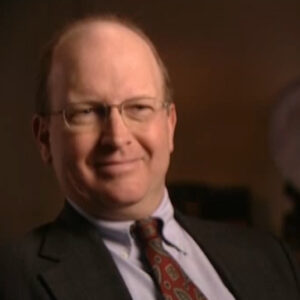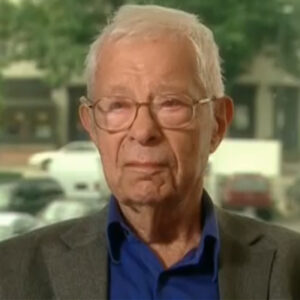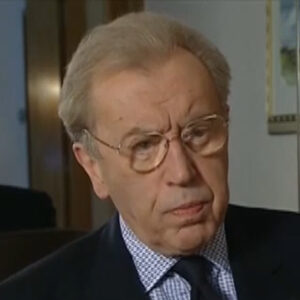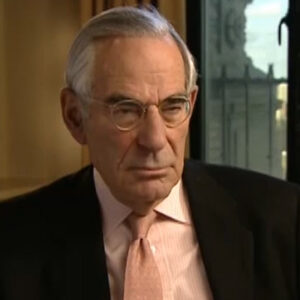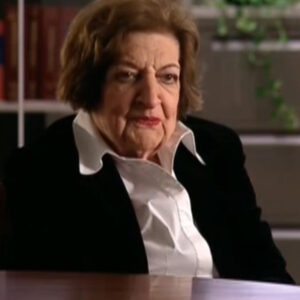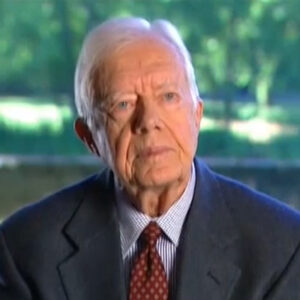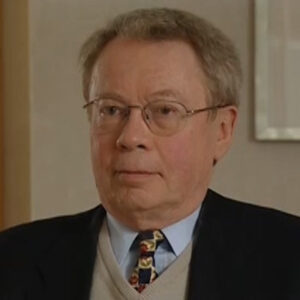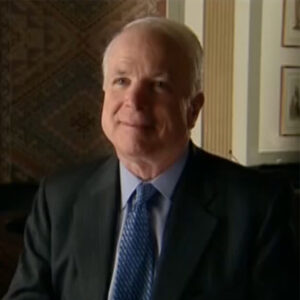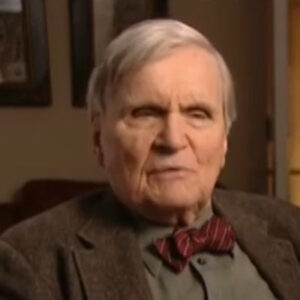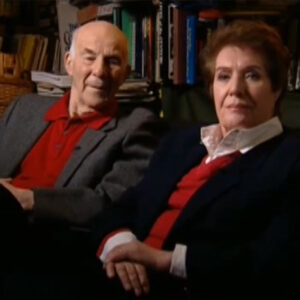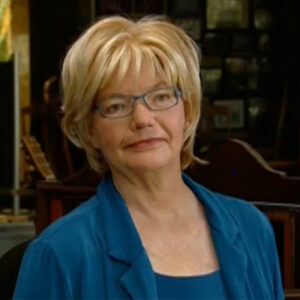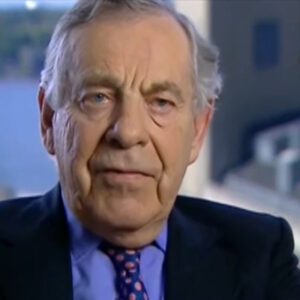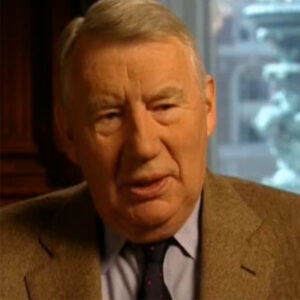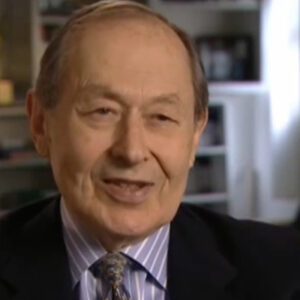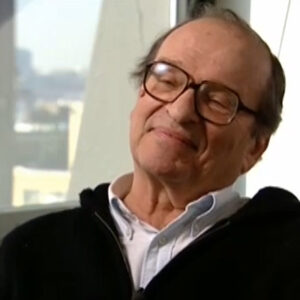Speaker I met Walter for the first time in Moscow in 1946. I was there, newly arrived. He followed me in, didn’t have a place to stay in the in the hotel. And I we had an office and a bedroom. And I think I’d put him up in the office for a few days until he and Bitsie got a room. There are.
Speaker And I understand that there was more than a few days. You were very generous and let him stay for three weeks.
Speaker That’s what he says he to know. I don’t remember the.
Speaker When when you were there and you met them and spent a little time because I understand they would have dinner with you sometimes. What? What was his character like? And what was Betsy? What was Betsy like?
Speaker I’ll bet he was a charmer. Very good looking, very nice. And with a sort of an improved sense of humor, and I think it was slightly astringent. She kept water in tow and it was that they were a nice couple. And he, you know, we are interests were were quite similar. And so there was no trouble with any conversation and try comparing notes and views and the rest.
Speaker And what kind of things were you able to import when you were in Moscow? Were you free to report on whatever you saw? Or was this censorship very, very tight?
Speaker The censorship was very tight. As was the case in probably all totalitarian states, access to the sources of news was practically nil. There are very few exceptions, but they kept a very tight rein on anybody reporting out of Moscow.
Speaker So what kind of stories were you able to tell?
Speaker Well, there was there was a continuing sort of political story and stuff that was it was in Provo or Izvestia was was I’ve forgotten exactly what what I reported. But there were various things happened. I remember cleaning died and there was a ceremony at at Red Square. And I saw Stalin up close for the first time. And the events of that sort were freed or freely, freely reportable. But one didn’t know what was going on. Leave when the one on holidays of big holidays, one would see the so-called icons. They would put up huge pictures of the police bureau. And one, the people drew their conclusions as to who was in and who was out and who’s close and who was not from the way these pictures were placed on the one arm of a building.
Speaker And I think on Red Square and the ones who are closest to Stalin were in and the ones who were on the outside were not so closely in. And when somebody was missing or a new one was added, it was, of course, quite a development.
Speaker Now, you both were Wireman and you were with the AP also.
Speaker I started with the AP, yes. But in Moscow I was with CBS and you both.
Speaker David Halberstam says that working as a reporter for the UPI or the AP was like a 24 hour deadline. I was trying to beat the opposition. Did you. Did you find that was so for you?
Speaker Yes. The GOP is really under any wire services. The AP is probably the same, but few service newspapers all over the world. There were deadlines around the clock. You don’t have the luxury of a of a daily newspaper. Those days, The New York Times, I think, are closed. So it’s wire at once, once a day that they service one on one edition of The Washington Post. Why should Washington Post on the and the of course, the Los Angeles Times and the Chicago. The Chicago Daily News was another great paper, but these things had the luxury of reporting sort of once a day, thinking about it once. A wire service reporter reported when when he got the news and then added to it or amended it or corrected it later on.
Speaker And did you get caught up with the site? Was it an exciting job?
Speaker A wire service job? Well, surely, yes. Because you were always looking. You were always thinking. You’re always adding to, you know, what you expected stories to break. And sometimes they did. Sometimes they didn’t. Then there was a story and why it didn’t break previous. It’s a moving, constantly engaging enterprise.
Speaker One of the things that Betsy said about Walter Cronkite was that he was competitive but not ambitious. Do you have any comment on that? Would you agree with that observation?
Speaker No, I’m not quite sure what she meant. Not ambitious. He I mean, everyone has some sense of ambition, of vision. But there was nothing in terms of his of his behavior.
Speaker There wasn’t the kind of Dovre of a personality.
Speaker Some just have some coffee, some water here, here. It’s like Revesby.
Speaker So do you have any thoughts about that?
Speaker It’s hard to. I don’t really know what Betsy might have meant by saying he was he was competitive, but not ambitious. Perhaps she meant that he he wasn’t as sort of a and an a personality of events striving.
Speaker And for the pusher, I use always soft shoe. And Bertie kept up with, you know, with his with his job and with with events.
Speaker Now, you both reported on the war in the Second World War, and this was obviously the experience of a career to report on this. And how did you how did that experience affect you feel your generation in terms of reporting? What was the experience of being on the field, being in in battle and reporting on what the events?
Speaker Of course, the the essence of reporting of radio reporting began with Murrow. He really invented it. He was in town himself doing something for CBS in Vienna when the Nazis marched in and he saw what happened then and what happened to the people of Vienna and what happened, especially to the Jews of Vienna, who because he was outraged. He was a man who was he demanded justice and he saw being violated at every turn. And he then he reported that that was his first reporting and that was the essence of his reporting and what he wanted of the people who worked for him just to see what it is that’s going on and reported straightforwardly not to add anything to it, not to not to be. Murrow never, never gave us any instructions as to what to do. He the people he chose were people who had worked for the rupee. And the rupee was a very hard school. People like Collingwood and Leuser and Downs and Smith and myself, all UPI people and being a news agency man meant that you were you were looking around the whole time your head was on a swivel to see what was happening, to find out what was happening, to hear what was going on. And that was the nature of the job. And it was it was not quite as true for radio because we had a little more time. But essentially, if something happened, we could get a circuit to New York and and report it. So we didn’t have the luxury of of DeLay and and firm deep thought which the which the daily newspapers had. But we had enough enough time to compose ourselves and get the story straight.
Speaker Now, I read the Murrow Boys, and you were certainly part of that group. Did you have did you all feel like you had a certain mission of what you hoped that your kind of reporting, the, you know, had a kind of vision of what your reporting. Could be for that for the country. I mean, did you have a vision as to what you are doing?
Speaker Not really. No, we were we were doing what we needed to do. We were reporters and we reported. I was not aware of the effect, for instance, that Murrow had on on the American public, which which really brought them to an experience of war that they couldn’t. Couldn’t have got any other way. We did we did our job. And and I I wasn’t really aware of the effect that it was having in the United States. Didn’t realize it really until I got home after the war.
Speaker Now, your experience of seeing men in battle and did you. Were you afraid? I mean, it’s really when you read the stories of what you all went through there on the field. Did you I mean, was it a terrifying experience?
Speaker Well, not really a terrifying experience. You had your you had your qualms on occasion to artillery fire. I was too close. But, you know, I think the. The experience with mean being an in a bomber band, I’m sure, is Baldor had the same experience. He was in a different kind of bomber and a different mission. I was medium bombers and being there you were. I mean, you you were afraid in principle, but you were there with a group of other people. And this is the sort of collective experience that made it really undesirable to be a to be frightened of yourself. And so you weren’t frightened. You were with them. And you your knees would knock a bit. But there was no there was no emotion to it.
Speaker Now, when you went over Normandy. Tell me a little bit about your experience flying over and seeing all the ships.
Speaker Well, who was it? It was an incredible sight to fly over the Bay of Normandy or the Gulf of Normandy on the way to the to the landing landing beaches. We landed at Utah Beach, which was the westernmost beach.
Speaker And the the sea was full of ships. It was unbelievable.
Speaker And of course, the other one is that these cruisers were firing like mad. And the landing craft were on the beginning to move in. We got the first speedboats at that Utah beach just as we went over having dropped our bombs. It was it was an incredible experience, an incredible picture. And I’ll tell you what effect it had had for me was it? It made me feel that it was it was impossible that this this massive effort would fail. I I really felt I had no doubts at all that it would succeed. Which was a bit a bit optimistic because it could have failed, but there was no sign of it. And Utah was the quietest of the beaches. So there was no there was no real opposition, nobody shooting it in the first few speedboats that came ashore. We’re not under fire. We did not have any enemy at the FBI, any Luftwaffe aircraft. Shooting at us or going door to door, attacking the oncoming infantry. It was it was a it was a milk run and patrol which had been flying. And we saw where the where the paratroopers had dropped and making this curve around it would land. We saw where the paratroopers had dropped. The sort of some of the chutes still and trees and sort of thing. It was a it was a remarkable spectacle and footage, was it? And we were fairly low. I mean, we are not our normal altitude to be 26 would have been 13000 feet.
Speaker But I think we flew into something like forty five hundred forty six hundred feet because the clouds were low. So we had a very good sight. And as far as the aircraft was concerned, well, we didn’t wear our flak jackets. We we spread them out on the floor of the plane because the pulleys would, you know, would come up from from from below or through it. But we didn’t we didn’t suffer any fire, any enemy fire at all.
Speaker And what and what was the experience you had at the Battle of the Bulge?
Speaker Well, the Battle of the Bulge was it was quite a remarkable thing. It was diet. It was a Sunday. We had we had briefings now. The first Army press camp, which was in the town of Spa in Belgium, which happened to be the German Kaiser is the imperial headquarters of World War One, for what that’s worth. And we had briefings, G2 briefings every day. And the last one we had was Saturday, and it was very quiet. And the briefer, who was somewhat short of ideal, said, well, you know, everything is quiet and the Germans are quiet. And they’re just waiting to see where we’re going to hit them next. And, well, like the next day is Sunday being quiet. I drove up to the to the hurt forest, which was one of the battlefields, one of the great battlefields of of World War Two in Europe. And does saw the 4th Division there. I hung around with mainly with the first with the fourth was American. I drove up and these welcomed me and said, well, you know. How did you come up?
Speaker I was I drove up the usual way, it was across a big dam and some roads and through wiped out Malmedy towns as I drove up. Why? Listen, did you see anything was ignored? And see today? Is that what they’ve been dropping paratroopers on the roads all night? And I said, why? Well, he said, then there’s an attack. And he took me into the map room, the G3, and there was a map of a sort of a a bulge which was beginning to spread like a tree. It was with arms and rest and it was pushing into our lines. And he said there’s a there’s a something big going on the south of us here. And that was that was the beginning of the Battle of the Bulge. Well, I got back to to spar and got off, got a circuit. I think I think we couldn’t raise New York, but I think we raised London, got the BBC and I was allowed, understandably, to report that the Germans were attacking because there was no mystery about it. And so I did it. And I think that was, I think, the first sign of the first news of the Battle of the Bulge. And then from then on, I went back to the to the sort of the northern periphery. You’re thinking this is a great arms stretching westward from the German lines. The North Ridge saw a very interesting it was beautifully done. The Germans pushing west tried to push north as well. Their goal was to get to the Murres River and then up to Antwerp. And if they had got to Antwerp, they would have had to have captured enough gasoline and and and all the fuel and ammunition enough to last them for the rest of the war. So they pushed in and tried to turn north. But the first division, which was the division I used to hang up, hang out with, was in the line right there. And they fought back like mad. And as they fought back, of course, the word got out that there’s something big happening down there. Troops began to move south from the northern, from our northern positions. The ninth army was the American army. Montgomery was in charge of the ninth army and some British troops. They all moved south and they fell into place along successively westward alongside the first division. And they they built a a rampart which prevented the Germans from turning north. And it was quite a remarkable thing, but it was beautifully done. And it succeeded because at the end of the day, it was not the end of the day, but in a matter of ten days or two weeks, the bulge was really that it was contained as a bulge, as a sack. And the Germans had to move back. But it was not just a a ground war in the very early phases.
Speaker It was a it was also an air war. But the air war that the bomb our bombing soon stopped because the of the winter weather and the valleys along which the Germans were moving. We’re just sort of covered with cloud like cotton wadding. And there was you couldn’t I mean, you couldn’t see what you were hitting and you couldn’t risk hitting us. So it was essentially a ground war. And it went on and got terribly cold. And I remember, of course, the first army who was really engaged very, very heavily, and they pulled their headquarters back. And at one point, I couldn’t find where they were moving. So I had something to say. And I had we had to drive to Brussels in the middle of the night to try to get through to New York and and see what was going on. It was mainly, I think, a color piece about how cold it was and how the men were fighting in this bitter cold.
Speaker But it was that’s what it was for. For about a week or so, it it wasn’t until Christmas time that it became apparent that the bulge had been contained and that the Germans would would have to have to go back. It was it was a nasty badly. The Germans came in with with American German tanks that they had captured. They were marked with a big Zis so that they wouldn’t shoot each other. And there was at one point they took some prisoners and shot American prisoners and shot them dead. It was a bitter thing. But at the end, as I say, after a week or 10 days, if I remember correctly, they were contained and had to move back.
Speaker Now, were you required to go anywhere you wanted? I mean, what was the kind of censorship you experienced during World War Two?
Speaker Well, the censorship was just precisely submitting a script to a censor and having him pass it. But for the rest, we were completely free to move wherever, wherever we wanted to go before the invasion. Eisenhower sent a directive to all commanders telling them to give all reasonable help to reporters, to people who were accredited to go to shamefully supreme headquarters, Allied Expeditionary Force. And the that’s what happened. We could go to anyone and talk with anyone who would talk with us and would travel.
Speaker We had a press camp with with jeeps at our disposal to take us any way we wanted to go. It was absolutely free. And of course, one thing to remember is that there was a there was a line not like Iraq today where you. You don’t know who’s going to bomb you or shoot you or stab you. There was a line that separated us from them. And behind the line, we were safe except for artillery on the line. Of course, there was infantry fighting and it was it was tough. But we could move anywhere we wanted to go. And it was and get back to to the we had a broadcast studio set up by Press Wireless and after that ran that worked for The New York Times and also carried that of a telephone, the telegraph pieces.
Speaker And it was it was a. The working conditions were not ideal.
Speaker We had we were we suffered from things that you never hear about any longer, which had disappeared from from broadcasting things like sunspots and static and fading. And we sometimes couldn’t get through to New York or New York, couldn’t get through to us. And we would. Why? We always had a schedule of the precise time to join the The World News Roundup, where other other broadcasts that were being carried out of New York. And there were times when I would I wouldn’t hear New York and I would sort of talk my talk up my presence in the in the studio until the appointed second and then start my broadcast. And occasionally it worked. But it was it was hit or miss. But the we got all the help we could. It was possible to give us. And if the if the sunspots and the atmospherics didn’t cooperate, well, there was nothing anybody could do about that.
Speaker Teflon answer, yes. OK, great.
Speaker Yeah. I just want to CBS correspondent into Germany. Is that true?
Speaker That desire is true to indeed with the first army.
Speaker Now, tell me a little bit about the experience of reporting on what you saw in the death camps.
Speaker I saw two. I saw a booger involved outside VI Ma on our way east to join the Russians and it had it had been cleaned up. That is to say, they had been liberated. I think Murrow was there before I got there and there were still people there. By the time I got there, there were only one or two inmates. And you saw what, you know, what sort of the Spartan conditions under which they lived.
Speaker The other one was in Auschwitz, the in the later on in August of 1945. Of the war long since over several months ago. And the the the the annihilation camp.
Speaker The extermination camp was a part of Auschwitz was Birkenau. And there it was. There was a body been cleaned out. There was no one there left for food. And they had blown up the sort of the shower rooms, which were used up to two hours as the poison gas chambers for people who were killed. But the you know, there was a gateway and over the gateway was in German was all about Mopti. Work will make you will froom breaking free will work, will liberate. And the there was a UN office there where the man who ran the camp had an and they were, they were sort of lampshades made of human skin with, with crude tattoos obviously that this creature wanted to have tattoos as souvenirs, heaven knows. And there was a there was this one literally lampshade with with a very crude tattoo. The inmates lived in barracks and lived on. They slept on shelves. There were these low barrack rooms and there were two or three levels of shelves are which they sort of it this they slept with the head out for put out toward the toward the passageway.
Speaker And they’re seated against the wall and over them for two or three, three feet perhaps was the next shelf.
Speaker And they were red and red with blood and with the red. The blood was the the, the bedbugs that had that had infested this place. So these people were not only there is because creatures as as as I said, to be exterminated.
Speaker But on their way, they lived this there and they were double roles of of of barbed wire and electric wire and saw signs, you know, stills and then the German. Be careful. Were high pressure, high high voltage, that sort of thing. It was it is a terrible place. But and cleaned up because it was it was a terrible place.
Speaker Did you at the end of. At the end of the war, did you feel that that war had affected the way you looked at the world and the way you looked at him? Did it affect your journalism? In a way? After going through that war and seeing the destruction and the devastation of so many human beings.
Speaker No, I wasn’t aware that it had any effect on me. It was a it was an event. It was an occurrence. It was my function to my my my my pleasure and a sense, my satisfaction to report what was going on and the bombing. And I mean, going into Berlin later and fighting.
Speaker This is totally annihilated city. I mean, this this. It was it was a complete sort of field of rubble. And what I remember is from India, the streets were covered with with with wreckage. And you when you looked up, you saw the sky through the narrow three empty windows.
Speaker And there was one place where they the the the the subway and then the Vilhelm Shizu to the farthest to the south below the sort of diplomatic quarter the subway had been hit by bombs. And there was an sort of an apocalyptic picture of of a street having caved in.
Speaker And if the thing blows or this ground water, of course, had been generated by that. And it was that this one had the sense of utter destruction and then sort of bodies floating in the in the sort of the entrances, the steps leading down to the to the subway stations. It was it was catastrophe. And in the in the in the worst sense. Dead horses, a few dead horses around.
Speaker Now to go back to being one of the Murrow boys. Did you? I know you’ve had said that that there wasn’t a vision that you went out and reported, but were you conscious that you were somewhat of an elite club? I mean, in a way, they called you in the moral voice. Were you aware that they you were being called a world order?
Speaker I’d never heard the expression until long after the war. I think stand proud and and and. Then Olson wrote a book called The Moral Boys, and I think that was the first time I was ever aware of the name for the group. In other words, the people whom whom Mirro had had hired in London to report the invasion and then report the war.
Speaker Now, why? Why wasn’t Cronkhite part of your group? I mean, he had had the same experience.
Speaker Wasn’t he a sort of natural to. Was he a different kind of reporter?
Speaker Well, I don’t know. I don’t know. I have the feeling and I don’t know what it’s what it’s based that Murro border to hire guys as well. I mean, it would have made very good sense. They were all he was Yewtree and that for whatever reason, he didn’t want to go. They didn’t want to join Murro. Not I mean, not that he had any objection to Murrow or Murrow’s work, but that he wanted to stay with the Opie militated. It can happen in Berlin in 1941.
Speaker Bill Schneider, or been a sort of Berlin correspondent for CBS and he offered me a job for CBS. And I was certainly very strongly tempted to go on. I want to see our bureau manager, the UPI bureau manager, a fine man made Frederiksen. And I said, look, I’ve been offered this job at CBS and the pay was enormous. But I was making three of the eighteen dollars a week for the UAP, which was the way the UFC did it. And I hope I really am. I’m really tempted to go.
Speaker And they said, look, please don’t, because I, I can’t get anybody else in it. I need you. You, you, you know, you, you’re here. You know, the trade. I would it would be a serious blow for the bureau if you were to leave. And I respected him highly. And so why I decided not to join CBS, but to stay with the rupee. As it turned out, it was a very good move because a few months later, I was arrested by the Nazis and put him put in prison. Had I been with CBS correspondent, New York wouldn’t have known me from a load of coal. And there’s nothing they could have done for me. There was nothing you could do for me either. But they gave me the the psychological sort of help of my knowing that they were there and doing what they whatever was they could do to help me out. So I could imagine that for Viorel, there would could be a reason for for Cronkite to want to stay with the U.N. rather than review with the UK rather than do. To join CBS.
Speaker Well, it seems that you both turned down offers from CBS because Cronkite did. And it’s interesting. There must have been something with the UPI. What was it about the appeal that got such a commitment from so many? I mean, from you, from Cronkite, from so many other people?
Speaker Well, it was it was of that was journalism at its best, I think, curative your work, your tail off. But that was part of the part of the business, you know, and you learn the trade. And I think you and the people involved were good. In in Berlin, Fredriksen or was it was a superb journalist and a very decent man. I don’t know who were who Cronkite’s bureau manager was. In London, it could have been Wally, Wally, Carol, who was another excellent man, really a great journalist. So it could be that the combination of of working for the underdog, we were the underdog to the AP and having a having a great job and seeing everything rural, young, totally inexperienced and and having having these sort of great role models as as the bureau managers that could have kept us with the Opie.
Speaker Now, when you moved to CBS, did you see a real difference? I mean, you, of course, were working for rural. Was there that same kind of standard for Murrow demanded?
Speaker Yes, I mean, he he didn’t demand anything, nor did he did he do any training and they didn’t do any. He didn’t do instructions. You you went out on a story and you came back and you wrote a script telling the story. And he didn’t read the script to you. You knew it was your story and you you knew what you were talking about. And so you talked about it. He never said so do it this way or do it that way or don’t do it this way here.
Speaker Well, you know, he hired the people. He trusted the European people he trusted and gave them their heads.
Speaker Now, did you ever notice any resentment from other journalists who were not part of your group?
Speaker No. No.
Speaker The 1948 Republican Convention in Philadelphia was the first time that CBS television is reporting the convention. You were there for radio. Everything was beautifully organized, whereas the television side of CBS wasn’t. Did you. Was there an attitude among you all and Murrow sort of looking down television at the beginning?
Speaker Not really looking down on it, but it was it was new. And then sort of the subject matter, though, we didn’t look down on television in 1948 with the Don Hewitt was the first sort of director. But it was it was brand new and small and it was joy. It was a curiosity. The real news was the radio news. You moved around, you talked to people. You you got it. You broadcast it, which is what you’d been doing, Bill, for the television was was a novelty do good. Not terribly impressive. And it wasn’t, as a matter of fact. I mean, there was nobody watch practically nobody watching. And it was just a camera standing, sort of talking to people. So there was no there was no need to be in all of or to be to be terribly impressed by television.
Speaker And in the end, you all ended up on television and we all ended up in television.
Speaker Yes. And it was it was good. And I was in I was in Germany. I was there. I was working in Bonn, the capital of West Germany. And when television really took off and took off, I think in in 1952 when the 52 election and I remember they sent us little eight millimeter cameras to film cameras with her, which I had no idea how to use, and that we had a camera man at our disposal. And I remember Save the Salt Water, did a report for television of something happening and in Bonn or having a political event and in Germany.
Speaker And they said, we’ll go somewhere, we’re run, go find a good background, go to go to the Siegfried line or something. And I said to myself, this is crazy. What what in heaven’s name? They wanted people in the background. John, tell the story out, but still have to be moving pictures of it. And so we even you know, as we got into television, it was more of a nuisance, more of a curiosity than it was the sort of same thing, the background.
Speaker There’s a sort of backbone of of news that it later became. And the the idea of of going somewhere, you you’re driving a half an hour to stand in front of something to establish that you were Anjo in Germany was so seen be just utterly ridiculous. And a bit later on Murrow team and we did we did specials. We did we did a German special in in Bonn and in Berlin. And we did I did one for him, John Howard Smith. And I did a an earlier one on Germany and where it was and where it was going and that sort of thing. A political thing with interviews and with with pictures that made sense. I never saw it, but it it was well received. And of course, the one that that we did with Murrow was what on was was fine. And occasionally then he would he would call us in to of course, every we had this year and round up in which all the people, the bureaus and we had five or six bureaus in those days. Today we have practically none. CBS came and we sat around the table and talked about the world and talked about where things had what had happened in the year and where it was going and what it meant.
Speaker And they were very successful broadcasts, except some genius who was who became president of CBS News, Richard Salaat, decided that he didn’t want talking heads.
Speaker And so he he he scrubbed what was, you know, what put people’s four years later referred to. He scrubbed it and set up something which which then just faded away and was due to nothing. And then and occasionally Murrow would call us in me and the others as well, too, would see it.
Speaker Now, he had this weekly broadcast and when he wanted something particular, he called us. And I remember.
Speaker And then is when he was focusing on on MacCarthy and on Koenen Shine, who were McCarthys helpers, whom he sent abroad to ask to smoke out communists in American embassies and and information centers.
Speaker I kind of went back to New York to report on Koenen Shine in Bonn. And of course, they were there with their spread to horror and fear among people. They had no idea of what what communism was. And then I knew about Hinduism. And so I went back and and we talked about that. I described, you know, with the effect that these people were having on Americans, American diplomats, diplomatic personnel abroad, and, of course, on the on the Europeans who watch this in sort of bewilderment. This is the sort of thing could happen, this sort of which is WITCH-HUNT in their countries. I’m sure the same in Paris and the rest. So, you know, we we we work for him and for television as it grew. And then he went and took it on.
Speaker Couple of couple of reporters about television feel that somehow the nature of television reporting was.
Speaker As deep as your radio reports.
Speaker I wouldn’t say that there was any radio people had any fear of television. The I mean, we we were all put became part of it. So there it was the. But I still feel that. I mean, when television is on as a running story, there is nothing that can beat it. It is perfect. And I mean, we’ve had the situations we had with a member of the when the the turnover and in the end of the Soviet system in in in Russia, in Moscow, there was a there was a television camera thing on the on on top of the ABC bureau over the office. And you can see the yellow the the so-called White House. It was the heart capital of the of the of the Russian Federation, the Russian republic. And you could see the tanks moving in here, see a television, see to see a revolution on television and of course, catastrophe’s and then and actions. Television is is incomparable. But for the rest, for for news and for for meaning, I think words are better. And we we see you too often now. There is a story told, an invoice, and the picture has practically nothing to do with it. It’s just there to be a picture so that they don’t have somebody standing there talking. And it’s ridiculous, sometimes just downright ridiculous. Whereas radio was is I mean, a word can be worth a thousand pictures and it’s immediate. And if you communicate it there, there’s no there’s no sort of the the circumstance that always attends the usual. He attends television, just isn’t there for radio.
Speaker Now, when you’re talking about a gathering that morale sometimes how to get a gathering of his correspondents together, you want to discuss what was happening with Walter Cronkite during this time? What’s he saying?
Speaker Well, we Wolf, while we were no, we well, we were during these so-called year end roundups, and they lasted only five or six years, if I if I’m not mistaken, until, as I say, the until the. The man who became the president of CBS News killed him no more. Cronkite was not yet at CBS in those years. So I don’t think he joined CBS. He joined WTOP in Washington. And I think it was later in the 40s.
Speaker So these roundups were televised, roundups were televised, yes, yes, indeed, yes, yes. No way. No one wondered wondered why Cronkite joined CBS. It was it were the real one. Did good, didn’t we? He wasn’t around. He wasn’t in the bureaus were thought when we did these right here and roundups.
Speaker Now, you had mentioned this histories of television begin with the growth and power of television news at the political conventions of the 50s. These events transformed the event. They covered. They transformed the way we understood the political process. Do you feel that Cronkhite had a role in changing that process? Because he was the anchor person who.
Speaker I think I think water. Yes. Who? Who really grew under it in the in the in the the political conventions of the of the of the 50s, I think. I mean, he he he handled it in such a way that people were able to follow and he he could be moved correspondents around to point to points at which the news was breaking. He got because he was well informed and was kept well informed. But he handled the information in such a way that I think people got more out of the television broadcasting of the the. This is the. Quadrennial year conventions than than they would have than they would have got from from broadcasting, from from radio broadcasting.
Speaker Do you agree that theaters White’s book on the making of the president?
Speaker Change political reporting from substance to technique, because other port reporters wanted to emulate white success but didn’t dump television to that to.
Speaker Yes, well, I think I think it does not be fair to Teddy White to say that it was technique and not not the substance. There’s plenty of substance in his book. It was just a new means of a new sort of device of reporting. And people have been imitating him ever since. And it was a superb insight into the nineteen fifty two campaign. And then, of course, you know, I think he’s did it later at the 1960 campaign. Walters. Walters contribution was I mean it was appropriate to do television. He handled the pictures, he saw what was going on and he added his own conclusions and his the deductions he drew from from what he heard and what he saw in in a way that added to the, you know, the pictorial spectacle.
Speaker But he was very much the middle of the line. He never really expressed. Personal opinion?
Speaker Not really Vietnam.
Speaker That’s right. No, no, no work, no water. Water was sort of commonsensical middle of the roader, and the result was sort of a dispassionate, objective reporting.
Speaker So what your memory of what happened when Cronkite. That after he had been to Vietnam and seeing the events and he came back and we basically reported that it was a stalemate and we should. What impact do you think that had? Do you think it had any impact?
Speaker Oh, yes, I think. I think it Tricon Cronkite’s conclusion that that of the Vietnam War wasn’t really going anywhere was something that pr a conclusion that people could have drawn for for themselves from a lot of the reporting from Saigon and from the from the battlefront. But his putting it so succinctly and directly, I think, had a considerable effect. And it had above all, and demonstrably a an effect on President Johnson, who when he saw that a man like Cronkite who had been, you know, who would be an objective, dispassionate reporter of news all the way through, that he could be moved to an opinion of that sort, meant that the American people would be would feel that same way. And they did. I mean, it wasn’t that there had been objections that there’d been demonstrations against Vietnam and so forth. But when when Cronkite joined them, it persuaded Johnson that that the jig was up.
Speaker That’s a lot of power that.
Speaker Someone, you know, an anchorperson has I mean, certainly today you don’t see that kind of power. You know, that report is that you get on the air today, they express an opinion. One doesn’t listen. But what was it about the power of of of that kind of. What do you think gave Cronkite that kind of power?
Speaker Because.
Speaker Perhaps he was the first on the scene with this technique works with this kind of this kind of broadcast.
Speaker I don’t know. I was I was away much of that. Much of those. Yeah. Those early years. But I would imagine that he had established his credentials with the with the audience. And it was a large audience and it was an audience at CBS, I think had the biggest audience of all was we had been an excellent news organization for so long.
Speaker But I think people people saw him as someone whom they could trust that he would not knowingly report anything that was an order or tolerate the reporting of anything that was false. So that was that was openly tendentious. So that was that was spin and then treated her as fact as all the rest of it. I mean, he would he would have sure.
Speaker He he’s reported spin on occasion and made it quite clear to the viewer, to the listener that this was something to be taken with a grain of salt in the way he handled it.
Speaker So he was his his credentials as an objective, reliable, trustworthy reporter were were were widespread. And I remember my neighbors, who at first was retired professors, who at first were rather scornful of television, bought themselves at my urging, perhaps a television set.
Speaker And before you knew what they were saying, well, Walter Cronkite said so-and-so and so-and-so, instead of saying that this had happened or that it happened or would have kro Walter Cronkite said that. Johnson said this, he had this. He had this manner.
Speaker He he couldn’t communicate himself. And the news that he that he handled two people are that way.
Speaker Now, you being someone who is raised abroad in your early years and then spent a good deal of your adult life reporting from from Europe and. Did you feel Do you feel that there’s something quintessentially American about Walter Cronkite?
Speaker Yes, I would say that Walter Cronkite was unmistakably and uniquely un-American.
Speaker I don’t think you’d get that. There are now presenters, as they are called, and have been Britain and anchor people and good ones, good ones in Germany and and and in France. Women, too. But no, Cronkite was was, I think, essentially an American phenomenon.
Speaker And the sort of the alternating current between him and the and the news audience was essentially American.
Speaker When I read David Halberstam spoke about the history of CBS. It really looks as if Paley was deliberately trying to tame Murrow and his voice in the 50s, that there was sort of. There was sort of a little bit of it seemed like the time that you all had to be able to do your reports seem to shrink down. What happened during that period? And why do you think that happened?
Speaker Were you all getting a little bit?
Speaker Well, I’m not sure the time we had on the air of radio was was not was wasn’t reduced and there was a lot of radio, there were a lot of radio specials.
Speaker When you all were on television, when we’re told.
Speaker Well, the. There was less television on the air than there was radio. And I think. Just two morals relationship with Paley, Paley had, of course, been very friendly and and and and had admired Murrow and had admired what Murrow had done, which is namely build up the best the broadcast news division of any network. And when he and Stanton would go down to to Washington as they had to go on occasion to renew licenses and things, what they would do would be to brag to the congressional committees about CBS News. And it was something worth bragging about. And the.
Speaker Admiral, of course, was this was the centerpiece of all of that. But as time went on and the corporation grew bigger and richer with the with the television revenue.
Speaker Paley was a business man. He ran a corporation. He was a CEO. He had a bottom line and the bottom line became more and more apparent. And the need to to expand revenues. Became more important, obviously, in his mind than the maintenance or the expansion of a news operation. And there was a time came a time in 1958 when Murrow went to Chicago for a meeting of the radio and Television News Directors Association, and he made a speech which, of course, scandalized Paley, one for these when he heard about it. I think I think, you know, Murrow handed him a copy of orders on his way to Chicago. And that would have made had had Paley read it then and objected to it. He would have made it anyway. Murrow would have made the speech anyway.
Speaker But the burden of his speech was a television had a responsibility and there was a responsibility not to make money and certainly not to make more money. Each successive year, but to inform people, to tell them what was going on, to alert them to the world around them, to make them. To inform them. Make them think. And that was not what the CEO of a major corporation had in mind. His corporate, his his. Understandably, it’s not nothing against Paley that he should sort of revert to CEO ism and demand that that the the economics of of of not working had to take precedence over everything else. And I think at that point, Murrow and Paley separated and Mark Murrow stayed on. Of course, he he did his. So did some of his his best work immediately after that. But that only clinched the hit the separation between him and and Paley. He did some of the remarkable things that the harvest of shame abroad.
Speaker Your Thanksgiving broadcast, which centered on the misery in which the migrant workers who brought the the the the the the turkey and the trimmings to the two Americas table lived and had to work. And he did Radulovich.
Speaker I was on civil rights. This man who had been dismissed from the Air Force because his father had drawn some totally innocuous, waved and seen at a communist rally or ordered or had had a communist friend.
Speaker This was a ended force that the Air Force to bring him back in. But this kind of of hard, hard biting, direct revelation to to the American audience of things that were wrong, were wrong with our attitudes and with our institutions, was not something that that Paley, the Paley wanted, not because he objected daughter or thought that it was wrong, but because it interfered with his major responsibility, which was to make money. And of course, it’s ironic that this was clinched some some few years later when Don Hewitt, who had been Murrow’s director and a fine, fine journalist when he invented 60 Minutes and he showed that CBS 60 Minutes could make money at that point.
Speaker News had to make money, and the only way to make money really was to get ratings. The way to get ratings was that a group of lower and lower and your common denominator. And this was the complete opposite of what of what Murrow had in mind.
Speaker What what do you feel it? What’s the difference between the Murrow era and the Cronkite era at CBS?
Speaker Do you feel there was a difference?
Speaker So I think there was a difference between the Murro era and the Cronkite era. Well, Murrow was Murrow when he did things that Cronkite couldn’t do. I mean, these documentaries that Murrow did and which ended with him basically were something to do that went out with him. And they they hardly I mean, there I think now and then there was a there was a kind of documentary, but there is nothing with the punch that Murrow could could give it.
Speaker And there’s certainly not nothing that I mean his his by his McCarthy broadcast was a matter of public national political significance, which, of course, a corporation which wants to be loved and to sell its widgets to to all comers, whatever their politics, whatever they’re they’re there. They’re right.
Speaker Their views are the deal with it to cut across. So Cronkite lived in a different environment from Murrow. He was a different man from Murrow. Murrow was was a man with. Well, he was he was unique. And Cronkite in his way is unique. But there are different people. And the journalism, the reporting of the Cronkite era was much more much lower key, perhaps. Well, that may not be that may not be just because there’s some big some striking reports on on the news, on the evening news. But it was a he was a different man. It was a different period.
Speaker Thinks that Cronkite said, which I thought was such an interesting image, was that he said it was like you had the news on one side and you had entertainment on the other side. And in the middle there’s this hallway.
Speaker And it was like this huge vacuum of entertainment sort of sucking the news towards the entertainment. And then maybe he was he’s in that transition, didn’t quite go into the full entertainment.
Speaker Now you have certain anchor people that are sort of just they could just be actors, you know? A lot of them don’t have the kind of, you know, profoundness of knowledge.
Speaker Well, there was there was for a brief period a play president of CBS News, who I think was coined or he was he was thought to have coined the word in 14.
Speaker And N14, which means it starts the search for the for the the lowest common denominator. And it’s reflected in human interest stories. Oh, smile is a great thing. A tier is even better. It communicates to people. It gets people watching your broadcast. It is the lowering of the of the lowest common to the common denominator.
Speaker And this is this is what happened to television journalism and the foil. Cronkite Obviously, there was no end for Taylor. The human interest stories did get onto one, then to television. The half hour television news became like Time magazine. A bit of news.
Speaker Hard news, sometimes very well presented. No resort.
Speaker And then features of human interest stories, little known gems or involves burial peculiarities and things.
Speaker And it was that was the whole book. And of course, sometimes there is much more in the way of love, the feature on television news and there is news.
Speaker But Walter Cronkite was there. There was still a good measure of news.
Speaker Well, one of the things where you hear when Cronkite reported on the assassination of JFK. Were you in the country?
Speaker I was, yes, I was in the country.
Speaker Yes, because I wondered about. The fact that his report after he made the announcement, he went on for three days, solid three days of reporting. Now, wasn’t that sort of the first time that anyone sort of kept going this morning?
Speaker Can you tell me a little bit about that and and how that you know, I mean, do you feel that in some ways it was a gathering around the nation around this huge incident?
Speaker Very much so. They put it to me. It wasn’t needed to focus attention on the event, and that’s it. That has implications. But it the it was Cronkite was able to get from all over the country aspects of the of the of what what what had happened to the United States and what had happened to the viewer, what was what the United States had to had to bear in mind.
Speaker But the fact that a president and three presidents have been assassinated before. So this is of wonder, an American feeling. But president like Kennedy, who was, you know, immensely popular and was youth personified and who is the Camelot of his his life and his wife.
Speaker There was Eve there was a special dramatic quality to him and Will Murrow above Cronkite handled it, refused to even be evenly and and and and sensibly and put it his.
Speaker What he what he did was to just amplify the effect of of of what had happened and the implications of what happened, because the consequences of what happened in terms of what people said, what they did, what happened in Congress, what happened.
Speaker One of the interesting, smaller technical aspects of that was, was when. When? Kennedy’s body was moved to Washington.
Speaker Don Hewitt got a camera on a train. And for the hours that I took the train to move from New York to Washington, he ran the camera. And that they feel the that the notion of moving with the train to the tracks behind you was was quite remarkable. It was it was he had he had quite a quite a sense.
Speaker But no know that the that was that was a the shattering news story. And it was it was handled it sensibly and evenly.
Speaker Now, the Cronkhite report on Watergate. He. In a sense, it was the all the networks were reporting on Watergate, but then he felt very strongly that the story was being sort of put in the back covers. And he then produced a special on Watergate, which sort of revived the bill.
Speaker I wondered if you could talk about that and the effect and the importance of that kind of. I mean.
Speaker Well, that was that was a touch of morale. I mean, this the sort of thing that that that morale would have done had he been around. But it was it was done with not a day of it. It wasn’t directed. It was a it was eh eh, eh, eh, eh, news performance.
Speaker I mean, it was it was a good you start again.
Speaker I don’t know what you’re talking about. Watergate, it’s just start. I thought that was wonderful. This is the kind of thing Watergate.
Speaker Watergate was the sort of thing that Murrow would have done to sort of bring it all together and in a half hour special and put where Murrow might have got some might have got some teeth into it.
Speaker Cronkite just presented it as factually as a sequence of events, leaving the conclusion unmistakable, as unmistakable as Murrow would have made it that this was a you. This was a disgrace of the of the worst sort and a cover up and a violation of the of the essential the political mores of the country.
Speaker Now, when Cronkite interviewed Unau Sa’adat, do you feel like that interview was. Someone responsible for the meaning of Sadat and Begin.
Speaker I mean, this is where your news story somehow gets out of your hands. Sound changes. I wonder if you could talk about the kind of story.
Speaker Yeah, I think it’s Sadat or the Sadat. Cronkite. You? I don’t know. Sadat did what Sadat had wanted to do, what he had already telegraphed that he wanted to do.
Speaker It wasn’t that he suddenly got the idea from Cronkite. Of going to Jerusalem. But he was a showman, too. And so there was you know, there’s this sense of of some of the. Sparkler Vural of. Innovation. But it does. So that was his old man. And he wasn’t he wasn’t persuaded to do it.
Speaker But even though I mean, I’m sure Cronkhite knew he was, as you said, Telegraaf, and people knew that he wanted to go. But I mean, here’s a situation where a journalist sort of pushes someone to say, OK, well, when are you going to go?
Speaker Oh, yes, fine, and the president picked it up and gun went off, forgotten what he answered. Whether you sign right tomorrow or next week or tomorrow. In ten minutes, I don’t remember, but. Oh, it gave him a chance to.
Speaker If you want to continue with what he intended to do.
Speaker I have a couple more questions since Cronkite returned. He has been consistently outspoken and critical of the press, including CBS, specifically saying that salaries have become too shall international coverage is lacking, etc.. Do you agree with these comments?
Speaker Yes. Yes. He’s quite right. And to me, that’s just a reflection of his own of his own sort of balanced view that he should say, for instance, that the anchor man paying, but I’m not sure what he what he earned and I’m sure was enormous in those in those standards.
Speaker I’m sure it was less than anchormen now get.
Speaker But what happens when a news bureau or a news operation has a budget from the corporation and there it is. And it can be spent in various ways. It can be spent having bureaus abroad, instead hub hiring more cameramen, or it can be spent on and on and on on an anchor man. If you have a bureau, if you have a budget of a million dollars and you paid your anchor man six million, you’ve got only two million to run the rest of your news operation.
Speaker So where he Cronkite is absolutely right that the that the the cameraman, the the the anchor man really are have have cut the news operations to a bone and that they’re there.
Speaker I don’t know who has used bureaus abroad. Now CBS has one or two men. They’re very good men in the Far East, Barry Petersen, and they have very good man in London, Richard Roth.
Speaker But they are they tend to be sort of firemen or pat parachute carriages who are dropped when the story breaks and you have a cameraman and then and go to work on work or go to a studio.
Speaker So when the growth of the anchor man has met the decline of the of the bureaus and the working reporters, the and the of course, these features are part of that, too. The the the function is to is to make as much money as you can and the product just reflects it. And the anchor man is part of that. A dynamic, attractive anchor man presumably pulls people into that that the channel.
Speaker Now, do you think that there is a line that should be drawn between people, for example, journalists, serious journalists and presidents that they should restrain from going on to shows like Oprah Winfrey and do Mary Tyler Moore Show? I mean, it’s interesting, Cronkite did show did it perform in some of these comedy? These programs appear in them. I mean, do you feel like there should be a line, that there should be some sort of division or you think it’s all entertainment?
Speaker No, I think I think a naked man should be an angry man and then stay obviously with the news.
Speaker He can do his news specials, but not to be a sort of a character man. And, you know, Oprah Winfrey, who was an excellent Bundy, loving I against Oprah Winfrey, but a character on Oprah Winfrey Show is not not what an anchor man should do. I don’t think so.
Speaker Do you think that international coverage has suffered in the last two decades? And if so, why?
Speaker And what are the implications for national coverage has suffered in a way in terms of American journalism? Because the bureaus have been closed. There is there is much, much less material coming from our own cameramen than before. The picture is still good on the air, but they are they are pictures that I got from the BBC or or from Merv from other from other television countries, networks or from MO, from cameramen who took over our road or a freelance cameraman. But the they’re they’re they’re not you know, they’re not. Our pictures are of a very good job, as good as we could get. But it is something that in June, when season one tends to see the same picture on occasion, I know that to some leverage, get the get their pictures, you get some of their pictures from the BBC.
Speaker And so you see the picture on the BBC and then you see the same picture. I’m on an American network. And as Shihad is, so in the old days, it wouldn’t have happened. We would have had their own cameraman. He would have shot the picture, maybe shot a better picture, more directly connected with the news story. Who knows?
Speaker My last question is, in the last chapter of his book, Cronkite says that his life hasn’t been a success because it didn’t feel he established the standards that lasted after he left.
Speaker This is a remarkable statement at the end. Autobiography.
Speaker I mean, here’s the classic American success story as well. He has friends, he has he’s a celebrity. And yet he answers book with this kind of a statement. What do you think?
Speaker I think.
Speaker It must’ve been a cloud of pessimism passed over him. I don’t think it’s warranted. I think he he did his work. He did his work well. He did his work on a on a high level of competence, of professional competence. His he has nothing to regret.
Speaker I don’t be that moral is.
Speaker Has become an icon, had something particularly to do with Murrow and Murrow’s time and morals work and the theory that Cronkite should should be sorry that he wasn’t another Murrow, he’s doing himself an injustice.
Speaker Do you think Cronkite is an icon? And if so, why?
Speaker No, I don’t. Cronkite is not an icon the way Murrow was an icon. They were different people at different times. Mauro.
Speaker Did not.
Speaker Gained the stature that he did with an evening news broadcast. I am not sure that to that he would have wanted that he wanted to do an evening television news broadcast. He did a weekly would see it now. He did specials. He did an evening radio broadcast.
Speaker But I don’t think he wanted to do it, and Cronkite’s Cronkite’s.
Speaker Life of world was the world of the evening news broadcast, and he did it well. And it was it was informative. And in Geo in terms of time, it did appeal to people that appeal to people through. Through this combination that that developed of news and feature and human interest and that sort of thing. And there’s nothing to be ashamed of in that. He did it. Well, he did. It is probably better than anyone else of his contemporaries did it, and they had some good contemporaries. So I think he’s being a bit harsh on himself.
Speaker Well, great. Thank you. Is there anything else you want to add the observations about Cronkite or anything else that I haven’t asked you that you might want to share? I mean, do you think he will be remembered? Or do you think in time?
Speaker Well, he will inevitably be remembered, but I don’t think they’ll be not the way Murrow was remembered.
Speaker I guess what I’m wondering is, did he make any contribution, did Walter Cronkite make any contribution?
Speaker Yes, he made the contribution of a of being a a steady, trustworthy source of information.

